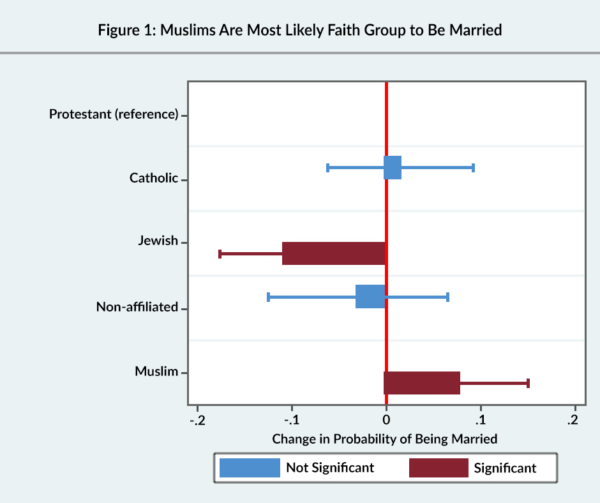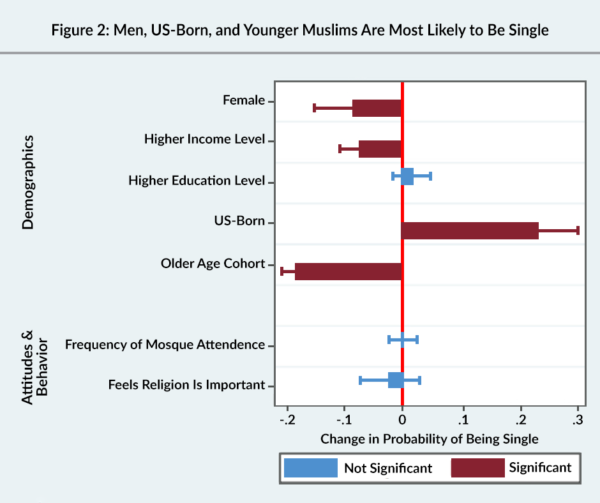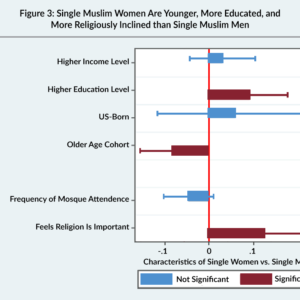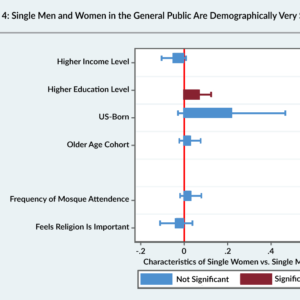What are the marriage trends among American Muslims?
Marriage is a constant topic in American Muslim circles. Islamic texts encourage marriage. But, given that a majority of American Muslims are first-, second-, or third-generation immigrants, the concept of marriage can take on heightened significance as the community continues to establish itself in the US while maintaining particular cultural and spiritual norms. Thus, while “aunties” and “uncles” have likely fretted over “wayward youth” since before Muslims set foot in North America, the current socio-political environment adds a distinct new twist to this classic concern.
More likely to be married than other faith groups
Using data from the general population in the US, it would seem that these community elders are well within their right to worry. Since 1970, the proportion of married US adults has fallen nearly 20 percentage points, while about half of all adults question the societal value of marriage altogether. Yet, when we turn to ISPU’s 2017 polling data, we find that Muslims are actually more likely to be married than any other major faith group or the non-affiliated (see Figure 1).
 Single Muslims tends to be younger than their Christian and Jewish counterparts
Single Muslims tends to be younger than their Christian and Jewish counterparts
Yet, even if Muslims as a whole outpace other comparable groups in marriage rate, the likelihood of being married may vary across key demographics. Figure 2 plots the probability of being single among American Muslims in our sample and reveals that men are more likely than women to have never married and that, not surprisingly, Muslim singles skew younger. Notably, however, the strongest determinant of single status among American Muslims is nativity, with the US-born nearly 25% more likely than their foreign-born counterparts to have never married.
 Single Muslim women are younger, more educated and more religiously inclined than single Muslim men
Single Muslim women are younger, more educated and more religiously inclined than single Muslim men
Figure 3 dives a bit deeper, revealing differences between American Muslim single men and single women. On average, we find that single Muslim women are statistically younger, more educated, and more religiously inclined than single Muslim men—disparities that are absent, for the most part, in the general public (see Figure 4). Since we do not have data from other time periods, it is hard to say whether this has always been the case in the Muslim community or whether these gaps are the result of recent trends. What is clear, however, is though there are more single Muslim men than Muslim women, single Muslim women may struggle to find a spouse as educated or religious as they are. This suggests that Muslim single women face a unique challenge when looking for spouses of comparable education and religious devotion.
NOTE: The plotted results in Figures 1–4 indicate the predicted change in the probability of the highlighted outcome as the variable of interest goes from lower to higher values (or in comparison to another category, as in the case of “US-Born” and “Female”). For ease of presentation, race/ethnicity was included in the analyses but not in the figures.
All the Single Ladies by Youssef Chouhoud was originally published by the Institute for Social Policy and Understanding. The article has been edited for length.
Youssef Chouhoud is a PhD candidate in the Political Science and International Relations program at the University of Southern California. As a Provost’s Fellow, his research interests include political attitudes and behavior, survey methodology, and comparative democratization. He is an ISPU Scholar and was the co-author of our 2017 American Muslim Poll.
Reflection Questions
- What surprises you about the poll results? Why?
- Mosque attendance among the American Muslims is similar to other religions. What does this say about religious practice in America?
- Why do you think Muslim Americans are more likely to marry than Americans of other faiths?
- How can this study explain relations between Muslims and non-Muslims in the United States?
- What other questions would you ask the poll participants on this subject?



